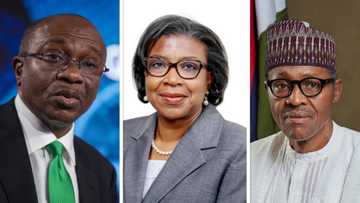"N100 for beer": Ex-Statistician-General Yemi Kale Speak on FG's Controversial 5 New Taxes
- The former Nigerian Statistician General, Yemi Kale, has commented on the impact of the new taxes introduced by the federal government
- He highlighted concerns related to these taxes on beverages, tobacco products, telecommunications, and car importation
- Ahmed Zainab, the Minister of Finance, signed the 2023 Fiscal Policy Measures that introduced the taxes
Former Nigerian Statistician General, Yemi Kale, has commented on the impact of the Nigerian government's new taxes which has attracted criticism from private sector.
Legit.ng had earlier covered the full details that the Federal Government is planning to implement and also private sector appeal to president Muhammdu Buhari.
The report showed that among other government intend to implement N75 per litre charge on alcholic wine and increase it to N100 in 2024.

Source: Facebook
Yemi Kale on the new taxes

Read also
"The biggest ever": Dangote Refinery announces start date for operations, invites Buhari to ceremony
Shedding light Kale, who is now a partner and chief economist at KPMG Nigeria, tated that the new taxes captured in the 2023 Fiscal Policy Measures may have more profound impacts on the beverages, tobacco and plastics sectors
PAY ATTENTION: Share your outstanding story with our editors! Please reach us through info@corp.legit.ng!
He also said car importation will also be affected but may have limited effects on the earnings of telecommunication service providers.
Kale explained that the telecommunication sector would find it relatively easier to pass on the new tax burden to consumers.
Impact of the new taxes
Kale warned that while the tax increase could bring potential benefits, it may also have adverse effects on other industries.
This is because consumers may opt to allocate their resources away from products like alcoholic beverages, tobacco, wines and spirits, and plastics, leading to reduced demand.
Kale pointed out that sectors that are highly sensitive to price, have comparable alternatives, and operate in an established black market, could continue to supply their products without adhering to tax obligations.
He further noted that the timing of the 2023 Fiscal Policy Measures might not be appropriate given the current economic climate, which is characterized by hyperinflation.
Kale also explained that the proposed tax increase could exacerbate the already declining business margins and lead to a further reduction in consumer demand, which could ultimately be detrimental to the economy.
Economists counter Buhari's claim Nigerian economy is better under him
Meanwhile, Economists, Industrialist and Manufacturers have questioned President Buhari's claim Nigeria's economy is better under him
Buhari had in an interview granted to international media firm, Bloomberg spoke about the successes of said his administration
The president also stated that he is leaving Nigeria’s economy better than he met it in 2015 when he assumed office /
Source: Legit.ng



